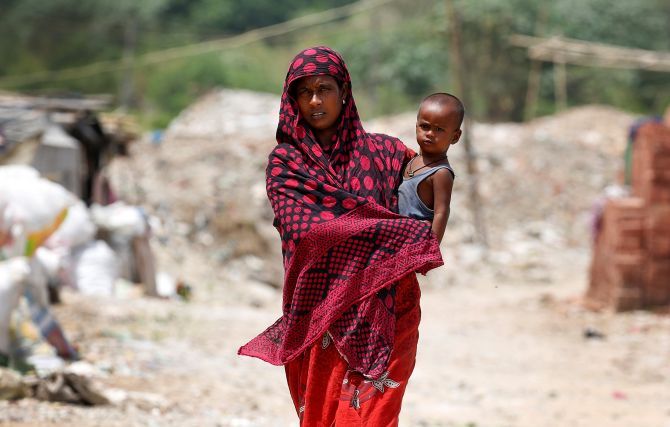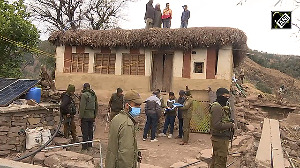'What kind of world player are you trying to be?'

A directive by the Union ministry of home affairs has earned the ire of human rights activists across the country.
The advisory directed states to identify and deport foreign nationals staying illegally in the country and to sensitise all law enforcement agencies to the risk posed by the Rohingyas in particular.
Lawyer Prashant Bhushan has filed a petition on behalf of the Rohingya refugees in the Supreme Court against the government's proposed order, stating that: 'Deporting them in these circumstances is against the Constitutional guarantees to refugees in India.'
Avantika Bhuyan speaks with Sahana Basavapatna, a Bengaluru-based lawyer and refugee rights activist, about the ramifications of the proposed order.
What are the factors that have led the government to come up with this advisory?
I feel the government is just playing to the gallery.
Let's step back in time a little. Some of the earliest Rohingyas entered India in the 1990s in trickles. They had no choice but to come to India, given the atrocities that were playing out in Burma.
Bangladesh was not an option, because of the situation there.
The Rohingya is a very vocal community.
A few years ago, when they were not given proper identification documents, they took the matter up with the United Nations high commissioner for refugees.
They present a potent combination in the eyes of the government.
They stay in the Muslim-dominated pockets of Rajasthan, Delhi, Jammu, West Bengal and Assam and move around the country in search of work.
What is your response to the statement in the advisory that calls them a security threat and considers them vulnerable to terrorist organisations?
This whole thing about them being connected with terror networks is exhausting.
I have not come across any information of even trials in which Rohingyas have been involved.
Look, usually refugees need to come to the UNHCR headquarters in Delhi to get their refugee status determination, or RSD.
But in the case of the Rohingyas, the UNHCR has the mandate to travel to the cities to get the RSD done.
All registration data that is with the UNHCR is necessarily shared with the ministry of home affairs.
So, you have the ability to keep tab on them.
If we are contemplating amending the Citizenship Act, 1955, to recognise illegal immigrants from Bangladesh or Pakistan, who are Hindus and Christians, why not these who have registered with UNHCR and undergone RSD?
Further, not so long ago, the government announced that Rohingyas would be issued with long-term visas, based on UNHCR documentation.
There are standard operating procedures that provide for a refugee verification process based on the criteria that is identical with what we have in the 1951 Refugee Convention.
This verification process would precede grant of long-term visas.
Given this background, for the government to now come up with this advisory and the Union minister of state for home affairs to state that UNHCR cards are not recognised by them is being highly irresponsible.
Human rights activists believe that India is bound by its obligations under the International Covenant on Civil and Political Rights and other international laws.
Of course, it's not just violating the ICCPR, but also the 1951 Refugee Convention and the 1954 UN Convention relating to the status of stateless persons.
The law, as held by the Supreme Court of India, is that an asylum seeker cannot be refouled to the country of origin if he or she will face persecution.
The advisory is also contrary to the Constitutional protections of Article 14 and Article 21.
The Supreme Court has also held that the government can't deport a person until the refugee status determination hearing is complete.
You have to understand that some people might be at different stages of the RSD, and they can't be asked to go till the procedure ends.
I don't see anything good coming out of such an advisory.
This will just lead to more arrests, illegal detention and harassment.
Families will be torn apart.
India's stand on this is despicable. What kind of world player are you trying to be?
We have a decent legal system, let's go through a fair trial process, in case you find any of them indulging in illegal activities.
Use your legal system, instead of issuing such directives.
What are the ramifications of this advisory on the Rohingyas in India?
I am informed that Rohingyas in Jaipur and West Bengal have been asked to leave by the end of September.
This is going to increase harassment.
Moreover, deportation is a lengthy process as it involves a trial, followed by collaboration between the external affairs ministries in both India and Myanmar, and the latter is not going to accept them back.
You are putting these people in a vulnerable position. Where are they going to go? \
They can't go to Europe, it's too expensive and some will die in the process.
There is no border between the Rakhine state and India. So, you will just leave them at the Bangladesh border.
There are practical implications of this as well, which no one seems to have realised.
IMAGE: A Rohingya refugee at a camp in Delhi. Photograph: Cathal McNaughton/Reuters












 © 2025
© 2025